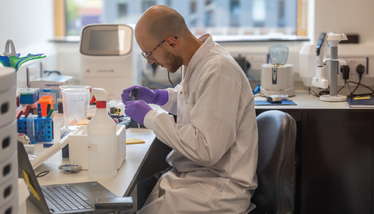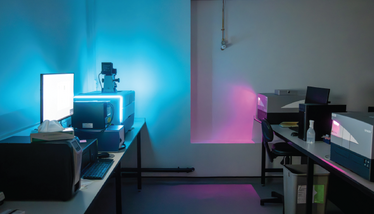Nanovesicles: An Approach to Improve Genetic Medicine
Proprietary nanovesicles technology has caught the eye of Eli Lilly. We find out why.
| 4 min read | News

Eli Lilly has signed up to use ViaNautis' proprietary polyNaut platform for the development of new genetic medicines. According to ViaNautis, the platform can enhance the design and delivery of polymer-based systems to facilitate intracellular transport of nucleic acids, including RNA and DNA. Effective delivery remains a critical hurdle in advancing genetic medicines to clinical and commercial stages. Lilly will be looking to use the technology to address the delivery challenges associated with genetic therapies. To find out more, we spoke with ViaNautis’ CEO Adi Hoess.
What’s the story behind ViaNautis?
Targeted polymer-based nanovesicles offer a new dimension in the therapy of many diseases where a lack of specific targeting limits efficacy or can lead to safety issues. The concept of creating target-specific nanovesicles capable of carrying small molecules, antibodies, or genetic medicines, was pioneered by Guiseppe Battaglia’s group over 20 years ago.
In 2018, ViaNautis was spun out of University College London (UCL) and co-founded by Battaglia, Francesca Crawford, and Denis Cecchin, a long-term researcher in Battaglia’s lab. The company was founded on key patents from Battaglia’s lab, which were exclusively licensed to ViaNautis, along with proprietary knowledge on generating its innovative polymer nanovesicle platform, polyNaut.
Since its inception, the company has achieved significant growth. In late 2023, the company closed a $25 million Series A financing round led by investors including 4BIO Capital, BGF, and UCB Ventures, with additional support from the Cystic Fibrosis Foundation, and Eli Lilly and Company. Existing investors including Origin Capital, Meltwind and O2H also participated.
We’ve also rapidly expanded the team, now employing over 35 staff members. Recent strategic appointments include Steven M. Altschuler as Chairman, Adi Hoess as Chief Executive Officer, and Ray Jupp as Chief Scientific Officer.

And what’s the story behind this collaboration?
The need for precise delivery in genetic medicines presents a tremendous opportunity to expand treatment options across a range of challenging diseases. ViaNautis’ polyNaut platform has demonstrated the potential for targeted delivery of genetic medicines to specific tissues, including across the blood brain barrier as pertains to CNS diseases, a breakthrough achievement. This success has sparked interest with leading pharmaceutical companies, ultimately leading to the partnership with Lilly.
What are you allowed to tell us about how your nanovesicles work?
The polyNaut platform is built on nano-engineered polymer technology specifically designed for targeted intracellular delivery. We have identified and developed polymers that can be synthesized at scale and that are compatible with the attachment of targeting ligands. These ligands recognize specific receptors on cells, enabling precise targeting.
Our nanovesicles are composed of a carefully selected polymer, either left uncoupled or coupled with ligands through efficient chemistry processes. A key advantage of our polymer-based approach is that the nanovesicles are formed through processes that result in high quality nanovesicles with exceptionally low polydispersity. A further advantage is that polymer-based nanovesicles do not form a protein corona, which allows them to evade non-specific liver uptake – a common limitation in conventional delivery platforms. Additionally, our nanovesicles have shown stability at 4°C, making them easier to store and distribute compared to other technologies that require freezing.
Unlike many current delivery platforms, our nanovesicles have demonstrated no immune response to date. This is a critical advantage as immune reactions are a common obstacle for many delivery technologies – specifically with adeno associated virus (AAV) where re-dosing is not possible because of the formation of neutralizing antibodies.
We believe that our polyNaut technology is highly adaptable, allowing for the encapsulation of a wide range of payloads, from small molecules to genetic materials. We refer to it as a 'bionic nanoparticle.' Its unique polymer structure supports the delivery of genetic cargoes with sizes that surpass the limits of both viral and non-viral delivery systems. To achieve therapeutic efficacy, polyNaut nanovesicles use our proprietary GoTo technology, which enables the efficient intracellular shuttling of these encapsulated molecules to the sites of transcription or translation as applicable.

What are the challenges of delivering genetic medicines?
Advances in genetic nanomedicines are hindered by the inefficiency of delivering genetic materials across biological barriers to reach specific sites of action. These barriers often prevent genetic therapies from being as effective as they could be, leading patients to have to compromise on treatments with limited efficacy or undesirable side effects. Traditional delivery methods, such as AAV and lipid nanoparticles (LNPs), face notable limitations: lack of cell specificity, payload inflexibility, suboptimal safety profiles and complex manufacturing processes.
Why do you think your nanovesicles can do better than other approaches?
I believe that our technology has great potential to make a significant impact on the genetic nanomedicine delivery space. Our nanovesicles precisely target specific tissues and cell types of interest, including difficult-to-reach areas (such as through the blood brain barrier) and by avoiding endosomal trapping through our proprietary phenotypic targeting approach which is tailored and controlled.
PolyNaut‘s precision phenotypic targeting is driven by two key attributes: barcoding (multivalent low affinity binding)-ligand-mediated interaction, which allows precise targeting of unique cell receptor signatures – and polymer brush peptide ligands around nanovesicles which enables binding energy control for precise interaction with target ligands.
Our nanovesicles enable highly controlled, efficient and effective endosomal release of the cargo into the cytoplasm through engineered disassembly of the polymer nanovesicle.



















